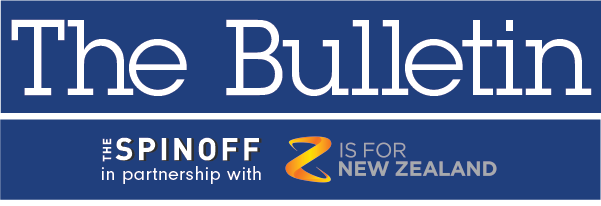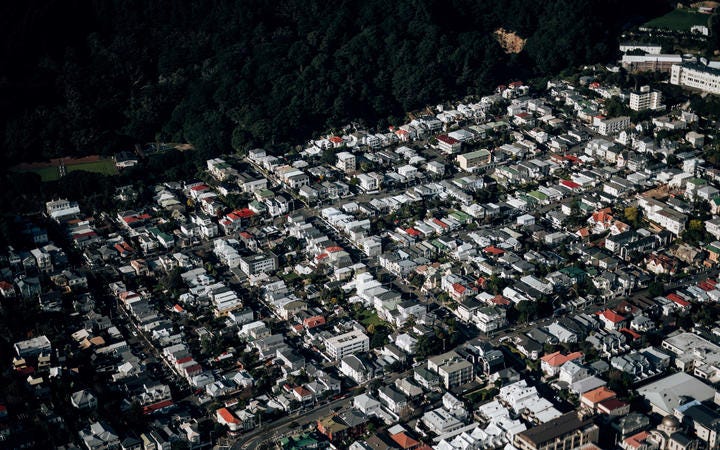How house prices are dividing the country
A new report finds that a majority of homeowners couldn’t afford to buy at current valuations after two years of soaring prices
Good morning and welcome to The Bulletin for Tuesday, September 7, by Justin Giovannetti. Presented in partnership with Z Energy.
In today’s edition: The country outside Auckland enters “delta two” tonight, seasonal worker scheme paused and a different look at the housing crisis.
Average property values increased nearly 27% in the year to August. (Dom Thomas/RNZ)
Can you afford your own home? Three out of five property owners could not afford to buy their home at its current value, according to new research from Consumer NZ. The finding shows the impact of two years of rapidly increasing house prices.
The biggest problem. House prices are clearly a concern weighing on the country’s mind, as the non-profit found that housing is the top issue for New Zealanders, outweighing Covid-19, as well as electricity and food prices. The study was conducted before the current lockdown, but it’s worth repeating that house prices are more top of mind than a deadly global pandemic.
The creation of two New Zealands. If you own your home, crunch the math and find out if you’re in that 60% who couldn’t attempt to buy their own home today. Maybe the deposit would be unmanageable and the monthly mortgage would be thousands more than you’re currently paying. However, you’ve paid off your mortgage or it’s quickly shrinking, so why should you care? I put the question to Gemma Rasmussen, the head of campaigns for Consumer NZ.
“The issue is that it means that housing is no longer accessible for the majority of people. It means that we now have this division of people in the country: those who own property and everyone else. It creates a division within New Zealand based purely on property,” she said.
A slippery bottom rung. None of this is new, but Consumer NZ’s data shows a different way of looking at the problem. It also reinforces the argument that of the people who don’t already have a foot on the property ladder, few will cross the threshold into the property-owning class without significant help from parents or two very high-paying jobs.
It’s not about blaming existing home owners, but the national discussion needs to change, Rasmussen said. “The narrative around home ownership has been around capital gains and investments. Not around houses as a home,” she said. “Home owners now expect prices to double every few years and those great gains to keep on coming.”
It’s a division few people would want. Earlier this year, the prime minister was asked if she was comfortable with a situation where New Zealand was divided based on property. She said she wasn’t. “No one wants to live in a country where the only way that you can move into your own home is if your parents can help you,” Jacinda Ardern told reporters in February. House prices have only increased since then.
Falling home ownership. The division is already starting to solidify, according to Consumer NZ. Home ownership is now at a 70 year low and falling. The group in this country most able to afford their property is counterintuitively the one that likely paid the most, those between the ages of 18 to 29. If that’s confusing, remember it only includes people in their 20s who already own their homes, which is likely a small group. Those younger people who can’t are likely still in flats, where almost half are spending over 30% of their income on rent.
Some more data. The average house price is now more than 12 times the average wage, at about $940,000. That’s up $200,000 in a single year. Of those that don’t own a home, 42% told Consumer NZ that they’ve been completely locked out of the market. Another 20% said they are trying to save for a deposit, but with housing prices still climbing at 10 times the average annual wage increase, they won’t be able to catch up.
Looking at Auckland, Stuff reported on the fastest increasing prices across the city over the past 20 years. It found that areas with former state homes increased the fastest, with the median house price in Point England increasing by 616% over the past two decades. The median value in 2001 was $176,400. Had that house increased at the rate of inflation, it would cost $267,111 today. Instead, it’s now valued at $1,263,250.
A housing crisis. While the AM Show’s Mark Richardson has said there’s no housing crisis, only young people who can’t afford a house, the data seems to suggest otherwise. Of all the people surveyed by Consumer NZ, 82% thought the housing market was either overinflated or out of control.
The housing crisis means different things to different people, far more than can be discussed in today’s newsletter. While increasing housing prices have already had an impact on poverty rates, a more lasting change could be felt in the coming years.
How it impacts the country’s future. As a relatively recent migrant to New Zealand, I wonder how the mixture of low wages and high house prices will impact international recruitment in a post-Covid world. This problem isn’t new to New Zealand, but the calculus has shifted tremendously since early 2020. A doctor or nurse would be paid more in Australia, North America or Europe and could buy a home that’s cheaper and likely of better quality. Meanwhile, New Zealand needs more skilled workers, and is searching for them abroad.
It’s not a theoretical problem. Stuff recently wrote about the problems tech companies are facing retaining New Zealanders being offered triple their local salaries in the US, that’s before stock options and bonuses. As a result, some local jobs are now being outsourced via Zoom to workers in India.
The Spinoff is doing our utmost to keep you updated on Covid-19 related news through this outbreak. Every dollar our members contribute directly funds our editorial team and is devoted to ensuring we do more. Click here to learn how you can support the team today.
Welcome to delta two. All of New Zealand except greater Auckland will move to a revamped alert level two tonight which the prime minister has dubbed “delta two”. It follows days without any transmission of Covid-19 outside the Auckland region.
As detailed in The Spinoff, the rules have changed over mask use, record keeping and gathering sizes. People are now required to wear face coverings when outside the home, including in shops, malls, cafes and bars. You're also legally required to scan or keep a record of your visits while out in the community. Gatherings are also now capped at 50 people, that includes restaurants, clubs and events.
The Covid numbers: 20 new community cases were reported yesterday, 25% of the previous day’s cases were active in the community while infectious. All the cases were in Auckland. The overall trend of daily cases is falling rapidly, but only 2,088 tests were conducted in Auckland yesterday. 821 cases have now been detected in the delta outbreak. 38,710 people were vaccinated yesterday.
A bubble for seasonal workers is on ice. Plane loads of seasonal workers from the Pacific were meant to start arriving quarantine-free this month, but the plan has been halted because of the delta outbreak. Only a few hundred RSE workers have come in under the programme so far. It's a blow to the horticultural industry and as Stuff reports, it's unclear when bubbles could reopen with Tonga, Samoa and Vanuatu.
Corrections passed up an opportunity to rehabilitate the Auckland terrorist. Muslim leaders told RNZ they are "baffled" by a decision by Corrections to send the attacker to a small Islamic centre instead of trying to rehabilitate him. The New Zealand muslim association says the attack on Friday at the LynnMall could have been avoided if more was done to try to help the man. The Islamic centre had limited resources and couldn’t do much. Instead, police put him under constant surveillance.
Wānaka looks to secede. A petition in the town has gathered nearly enough signatures to start the process of splitting from the Queenstown lakes district council. A number of locals have found the council to be too Queenstown-centric, according to RNZ, including a local mechanic at the centre of the effort. Once enough signatures are gathered, something that now looks likely, a commission will investigate breaking the district up. This takes place in the wider context of a debate at the Beehive about how much power local government should have at all.
Sir Tim and council can't get along. An independent review has found mayor Tim Shadbolt is an "unavoidable and inconvenient distraction" in Invercargill council, the Otago Daily Times reports. The review was positive about council overall and found that it was muddling through as best it can. However it painted the mayor in a negative light, finding that he'd left a leadership void in the city and was struggling. Responding after the report was introduced, Shadbolt voted against another review.
The end of the St James? Chris Schulz has written an ode in The Spinoff to the Auckland theatre, which might close for good after five years in renovation hiatus. The pictures in the piece, as well as the people he spoke with, tell the story of a venue that's been far more than a theatre for many people. Political apathy, red tape and a failed construction project nearby have stalled work and might now seal the fate of the grand old dame and a piece of central Auckland’s heritage.
Got some feedback about The Bulletin, or anything in the news?
Get in touch with me at thebulletin@thespinoff.co.nz
Leah Panapa took over for Peter Williams on Magic Talk. How’d it go? (Tina Tiller)
Right now on The Spinoff: Sam Brooks documents the shift from hell as Leah Panapa faced an audience that was angry over the sudden departure of Peter Williams. Alex Casey looks at Celebrity Treasure Island and finds a group of happy people having a nice time and competing for something that ultimately means nothing. Paul Gorman asks forecasters why we didn't see the Auckland floods coming. Anna Sophia and her son Connor discuss what’s happened since her son told her he was a boy and not her daughter. The hardworking Sam Brooks looks inside Viva La Dirt League, a YouTube empire I'd never heard of before, but is built on parodies and being goofy.
For a feature today, the life and death of Zaki Anwari. It’s likely you’ve never heard about the 17-year-old before, but Anwari died in late August when he fell from the side of an American transport plane taking off from Kabul. A soccer loving teenager who was born and grew up in an Americanised Kabul, Anwari wanted to follow his brother abroad and pursue a university education. Then the Taliban arrived. Foreign Policy has a movingly written feature about what Anwari’s death means about an urban Afghanistan that’s slipping away:
Days before the fall of Kabul, after key provincial capitals around the country fell, thousands of Afghans started seeking safety in Kabul after the Taliban intensified their military campaign to take control of the country.
Some young people came together to raise funds to help the displaced people with food, medicine, and other essential supplies. Zaki joined them and became intensely involved with raising money and buying and cooking food for his displaced compatriots. A few days before the Taliban took Kabul, Zaki emptied his cupboard of most of his clothes, telling his mother and Zaker “these don’t fit me anymore,” and filled a plastic bag. “He went and distributed his clothes among the displaced families,” Zaker said.
In defence of the red card. After the All Blacks crushed the Wallabies in Perth over the weekend, the debate is now revolving around a kung fu roundhouse flying kick from Jordie Barrett to an opposing player’s face. The kick might have actually just been a kick. The NZ Herald (paywalled) has an explainer on the Bledisloe Cup contact and finds that while it was unintentional, young Barrett was right to be red carded. The story comes equipped with a flow chart detailing how on-pitch officials are supposed to understand what they are seeing, along with help from TMO.
That's it for The Bulletin. If you want to support the work we do at The Spinoff, please check out our membership programme.







